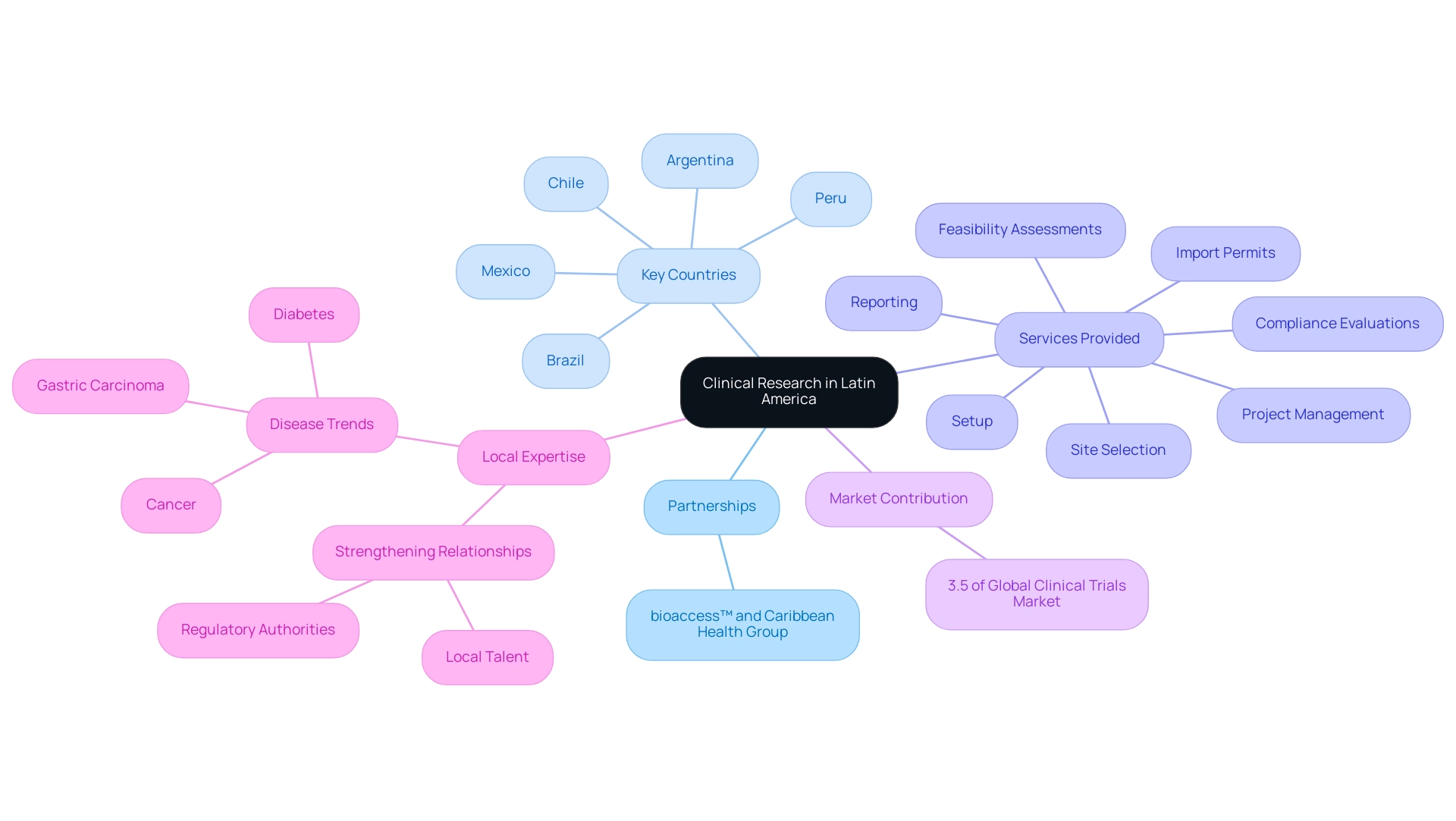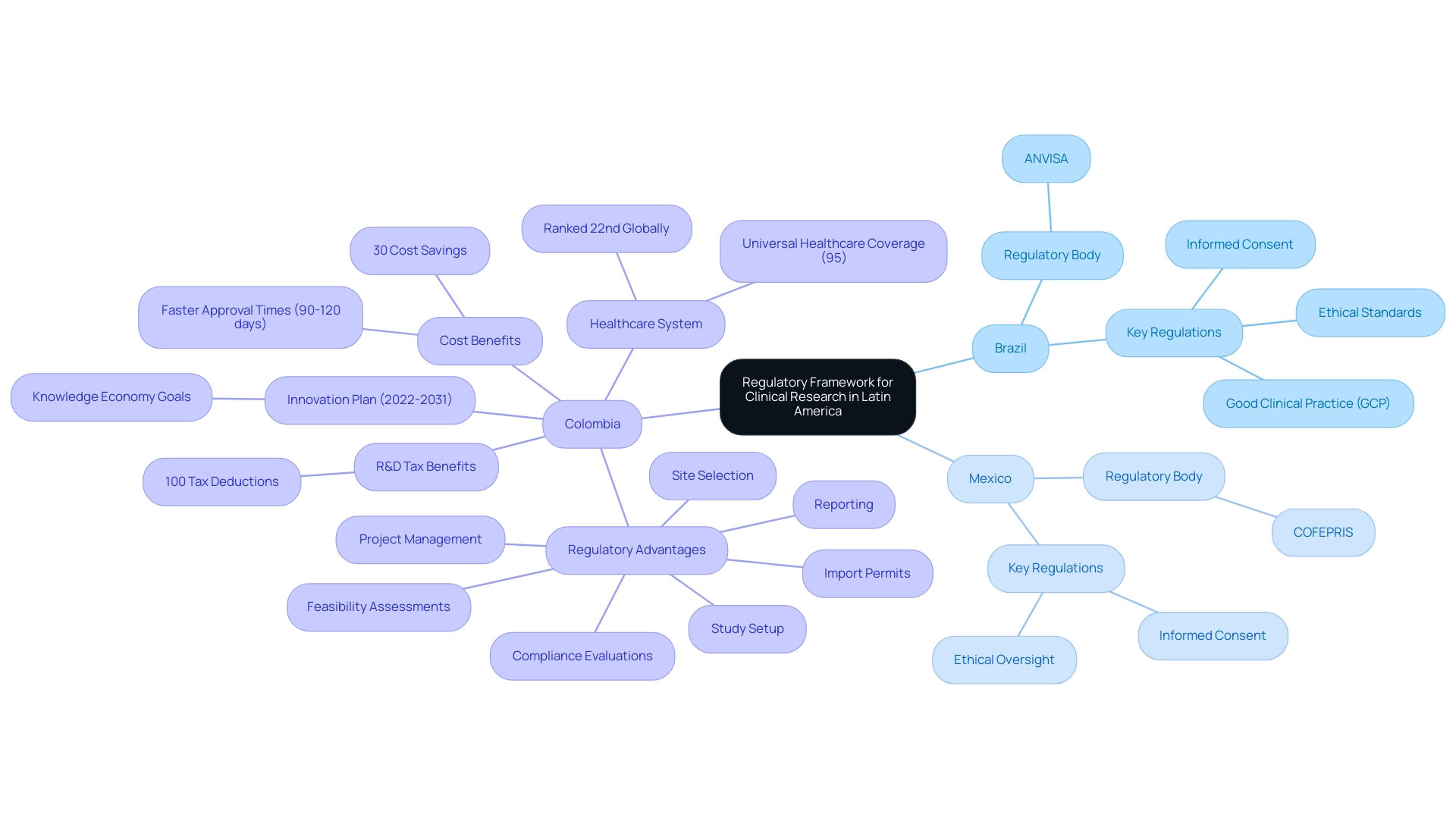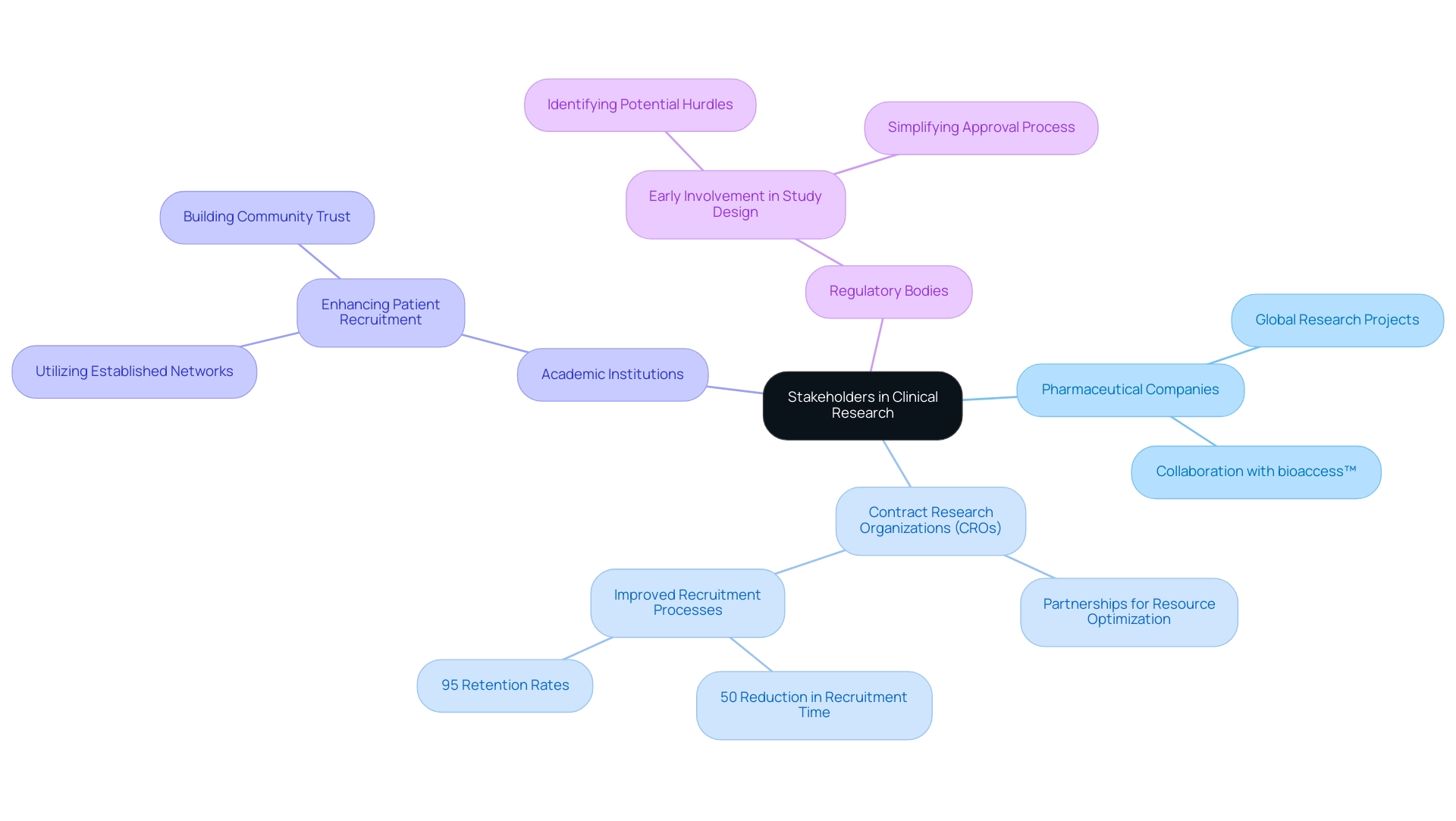Overview
Clinical research in Latin America is characterized by its diverse regulatory environments, strategic partnerships, and the region's unique patient populations, which enhance the quality and relevance of medical studies. The article emphasizes that recent collaborations, such as the one between bioaccess™ and Caribbean Health Group, along with supportive regulatory frameworks and reduced operational costs, position Latin America as a vital player in global clinical research, particularly in addressing local health challenges like cancer and diabetes.
Introduction
As the landscape of clinical research continues to evolve, Latin America emerges as a pivotal player in the global arena. This region, rich in diverse populations and unique healthcare challenges, offers a fertile ground for innovative clinical trials that can yield significant insights and advancements in medical science. Recent collaborations and strategic initiatives underscore Latin America's commitment to enhancing its clinical research capabilities, positioning countries like Colombia, Brazil, and Mexico at the forefront of this endeavor.
With robust regulatory frameworks and a growing network of Contract Research Organizations, the region is not only attracting international interest but also addressing pressing health issues such as cancer and diabetes. This article delves into the key characteristics, challenges, and opportunities within Latin America's clinical research sector, shedding light on the vital roles played by stakeholders and the importance of regulatory compliance in fostering a thriving research environment.
Overview of Clinical Research in Latin America: Key Characteristics and Contributions
Investigative studies in Latin regions have positioned themselves as a crucial component of clinical research in Latin America and the worldwide testing framework. The varied inhabitants of the area are a significant asset for clinical research in Latin America, enhancing the quality and relevance of the findings. Recent partnerships, like the one between bioaccess™ and Caribbean Health Group, aim to establish Barranquilla as a premier location for clinical research in Latin America, with the backing of Colombia's Minister of Health.
This collaboration provides extensive management services for studies, including:
- Feasibility assessments
- Site selection
- Compliance evaluations
- Setup
- Import permits
- Project management
- Reporting
These services are essential for enhancing processes. Brazil, Mexico, and Argentina remain key players in the field of clinical research in Latin America, bolstered by robust regulatory frameworks and an expanding network of Contract Research Organizations (CROs) that facilitate regulatory compliance and optimize patient recruitment. In 2023, clinical research in Latin America accounted for 3.5% of the worldwide medical study matching software market, highlighting the area's importance in medical research.
Mariana Bei, Sr. Director of Clinical Operations and Brazil GMBA at Parexel, notes that having a local presence strengthens relationships with local talent and regulatory authorities. The rising occurrence of illnesses such as cancer and diabetes in Latin regions further emphasizes the necessity for clinical research in Latin America, particularly in high-prevalence locations like gastric carcinoma in Chile and Peru. Moreover, progress in health technology, including recent eHealth data for Chile, is crucial for improving the efficiency and effectiveness of medical studies.
This local expertise and collaborative spirit position the region as an increasingly appealing destination for pharmaceutical firms seeking to enhance their capabilities through clinical research in Latin America while adhering to international quality standards. Notably, the collaboration has achieved over a 50% reduction in recruitment time and impressive 95% retention rates, demonstrating the effectiveness of the initiatives undertaken.

Challenges and Opportunities in Conducting Clinical Trials in Latin America
Clinical research in Latin America presents a distinctive blend of challenges and opportunities that require careful navigation. One significant hurdle is the diverse regulatory environments across various countries, which can result in delays and escalate costs. In Colombia, the INVIMA (National Food and Drug Surveillance Institute) plays a crucial role as a Level 4 health authority, overseeing medical device regulation and ensuring compliance with international standards.
Colombia has acknowledged the advantages of enhancing its medical investigation environment, as demonstrated by its ambitious science, technology, and innovation strategy for 2022–2031 aimed at becoming a knowledge economy. This commitment aligns with Colombia's recent recognition of its membership in the OECD, promoting adherence to best practices in clinical research in Latin America. Furthermore, the new Colombian R&D tax credit enables small and midsize companies to claim a 50% tax credit on R&D and innovation projects, offering a financial incentive that improves the practicality of conducting experiments in the region.
Cultural nuances also play a critical role, influencing patient recruitment and retention strategies; tailoring approaches to effectively engage local populations is essential for success, particularly in understanding the local healthcare landscape and patient expectations.
Despite these challenges, the advantages of clinical research in Latin America are compelling. The area provides considerably reduced operational expenses in contrast to North and Europe, making it an appealing choice for sponsors looking to carry out studies effectively. Furthermore, the availability of treatment-naive patient populations enhances the potential for meaningful outcomes.
Recent developments, such as Colombia's allowance for foreign manufacturers of non-FDA-approved medical devices to collaborate with local manufacturers, highlight the market's value, estimated at $1.42 billion. The increasing investment in healthcare facilities, along with the skills of local study groups, is poised to enhance the region's ability to carry out successful medical evaluations in the future. As demonstrated by the fact that 52% of worldwide medical studies are now performed outside the U.S., clinical research in Latin America is emerging as a favored location due to simpler recruitment, reduced expenses, and enthusiastic investigators in nations with universal healthcare systems, highlighting its crucial role in the global medical investigation landscape.
To ensure comprehensive study management, our services encompass:
- Feasibility studies
- Site selection
- Compliance reviews
- Setup
- Import permits
- Project management
All tailored to meet the unique regulatory requirements of each country.

Regulatory Framework Governing Clinical Research in Latin America
The regulatory framework for clinical research in Latin America is characterized by significant diversity, with each country establishing its own set of regulations and overseeing bodies. In Brazil, the National Health Surveillance Agency (ANVISA) plays a crucial role in regulating research studies, ensuring adherence to ethical standards, informed consent, and Good Clinical Practice (GCP). Conversely, Mexico relies on the Federal Commission for Protection against Sanitary Risk (COFEPRIS) for similar oversight.
Grasping these regulations is essential for sponsors and Contract Research Organizations (CROs) seeking to navigate the intricacies of clinical research in Latin America effectively.
In Colombia, the regulatory environment is especially advantageous for carrying out first-in-human (FIH) research due to its extensive management services, which encompass:
- Feasibility assessments
- Site selection
- Compliance evaluations
- Study setup
- Import permits
- Project management
- Reporting
A critical aspect of these services is the review and feedback on study documents to ensure compliance with country requirements. The country offers cost savings of over 30% compared to trials in North America or Western Europe, along with faster approval times, typically requiring only 90-120 days for the IRB/EC and INVIMA reviews.
Colombia's healthcare system has been ranked 22nd globally by the World Health Organization, further enhancing its reputation as a high-quality destination for clinical research in Latin America.
With a population exceeding 50 million, Colombia provides robust patient recruitment opportunities, supported by universal healthcare coverage for about 95% of its citizens. This extensive coverage facilitates access to a diverse patient population, which is essential for clinical research in Latin America, making recruitment more efficient. Furthermore, the nation provides substantial R&D tax benefits, including 100% tax deductions for investments in science, technology, and innovation initiatives, making it an appealing option for project sponsors.
As Julio G. Martinez-Clark, CEO of bioaccess, notes, 'Colombia has recognized these benefits and has an ambitious science, technology, and innovation plan for 2022–2031 to become a knowledge economy.' Such initiatives exemplify the commitment to fostering a robust regulatory environment that supports clinical research in Latin America. Furthermore, it is essential for researchers and sponsors to confirm they have read the privacy policy before submitting any applications, as this is a critical aspect of regulatory compliance.
Lastly, the reporting process, including tracking study status and documenting serious and non-serious adverse events, is vital for maintaining transparency and accountability throughout the study.

The Role of Stakeholders in Clinical Research: Collaborations and Partnerships
Stakeholders are pivotal in shaping the success of clinical research in Latin America. The intricate nature of conducting clinical research in Latin America necessitates robust collaborations among:
- Pharmaceutical companies
- Contract Research Organizations (CROs)
- Academic institutions
- Regulatory bodies
For instance, during a gathering on March 29, 2019, in Miami, FL, the partnership between bioaccess™ and Caribbean Health Group was revealed, intending to position Barranquilla as a prominent location for research studies.
Colombia's Minister of Health, Juan Pablo Uribe, attended this meeting and highlighted the initiative's significance for improving clinical research in Latin America, stating, 'This collaboration is crucial for advancing our clinical study capabilities and attracting global research projects to the region.' Such partnerships not only facilitate knowledge sharing but also optimize resources and ensure compliance with regulatory frameworks. Engaging local universities significantly enhances patient recruitment efforts, utilizing their established networks and community trust.
Furthermore, as Dushyanth Surakanti, Founder & CEO of Sparta Biomedical, noted regarding his experience with bioaccess® during its first human study in Colombia, these collaborations have resulted in substantial improvements, including over a 50% reduction in recruitment time and 95% retention rates. Involving regulatory authorities early in the study design process enables the identification of potential hurdles and simplifies the approval process. As Natalie Gershman, CEO and medical director of Geny Research, states, 'This relationship significantly helps to increase subject enrollment and retention rates, and improves patient compliance.'
A case study titled 'Future Trends and Opportunities in Latin American Clinical Research' illustrates how local engagement and the use of telemedicine are streamlining patient recruitment, thereby creating opportunities for targeted trials in clinical research in Latin America, especially for diseases prevalent in the region. According to Statista, the number of registered research studies by country reflects the growing importance of collaborations in this landscape. As the environment for clinical research in Latin America evolves, particularly with the rise of digital health technologies and a focus on personalized medicine, fostering strong relationships among stakeholders will be critical.
These collaborations will not only advance research initiatives but also contribute to improved patient outcomes in the region.

Conclusion
Latin America's clinical research landscape is increasingly recognized for its unique contributions and opportunities within the global framework. The region's diverse populations and pressing health challenges provide an ideal environment for innovative clinical trials, particularly in countries like Colombia, Brazil, and Mexico. Recent collaborations have demonstrated the potential for significant advancements in medical science, with partnerships optimizing trial management processes and enhancing patient recruitment and retention.
While challenges such as regulatory diversity and cultural nuances exist, the advantages of conducting trials in Latin America are compelling. Lower operational costs, access to treatment-naïve patient populations, and a commitment to improving healthcare infrastructure position the region as an attractive destination for pharmaceutical companies. The supportive regulatory environment, exemplified by Colombia's initiatives and incentives, further enhances the feasibility of conducting successful clinical trials.
As the clinical research environment continues to evolve, the role of stakeholders—including pharmaceutical companies, Contract Research Organizations, academic institutions, and regulatory bodies—will be critical. Effective collaborations and partnerships will not only facilitate compliance with regulations but also streamline processes and improve patient outcomes. Emphasizing the importance of local engagement and leveraging advancements in health technology will be vital for realizing the full potential of clinical research in Latin America, ensuring the region's pivotal role in advancing global medical science.
Frequently Asked Questions
Why are investigative studies important in Latin America?
Investigative studies are crucial in Latin America as they enhance the quality and relevance of clinical research findings due to the region's diverse population.
What recent partnerships have been established to promote clinical research in Latin America?
A notable partnership is between bioaccess™ and Caribbean Health Group, aimed at establishing Barranquilla as a premier location for clinical research with support from Colombia's Minister of Health.
What management services are provided through this collaboration?
The collaboration offers extensive management services including feasibility assessments, site selection, compliance evaluations, setup, import permits, project management, and reporting.
Which countries are key players in clinical research in Latin America?
Brazil, Mexico, and Argentina are key players, supported by strong regulatory frameworks and a growing network of Contract Research Organizations (CROs).
What percentage of the worldwide medical study matching software market did clinical research in Latin America account for in 2023?
Clinical research in Latin America accounted for 3.5% of the worldwide medical study matching software market in 2023.
How does having a local presence benefit clinical research operations?
A local presence strengthens relationships with local talent and regulatory authorities, which is beneficial for conducting clinical research.
What health issues underscore the necessity for clinical research in Latin America?
The rising occurrence of illnesses such as cancer and diabetes, particularly in high-prevalence areas like gastric carcinoma in Chile and Peru, emphasizes the need for clinical research.
How does progress in health technology impact clinical research in the region?
Advances in health technology, including recent eHealth data for Chile, improve the efficiency and effectiveness of medical studies.
What are the results of the collaboration in terms of recruitment and retention rates?
The collaboration has achieved over a 50% reduction in recruitment time and impressive 95% retention rates, demonstrating the effectiveness of the initiatives undertaken.




